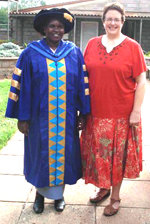Resistance Training May Improve Nerve Health, Slow Aging Process
Simple resistance training may help counteract age-related nerve deterioration that puts seniors at risk of injuries from falls and other accidents, according to cross-institutional research led by postdoctoral researcher JoCarol Shields and Department of Exercise Science Professor Jason DeFreitas. The…


 As part of the partnership program, Syracuse University will receive $860,700 for “Building Capacity through Quality Teacher Preparation,” a partnership project between SU and Kenyatta University in Kenya, East Africa, with the goal to prepare and support teachers to become proficient in their subject matter and instructional design, while also assisting with the development of learning communities and establishing a framework for continuous professional growth of teaching practitioners. This funding is for the first two years of this collaborative project, with the possibility of more funding in future years.
As part of the partnership program, Syracuse University will receive $860,700 for “Building Capacity through Quality Teacher Preparation,” a partnership project between SU and Kenyatta University in Kenya, East Africa, with the goal to prepare and support teachers to become proficient in their subject matter and instructional design, while also assisting with the development of learning communities and establishing a framework for continuous professional growth of teaching practitioners. This funding is for the first two years of this collaborative project, with the possibility of more funding in future years.